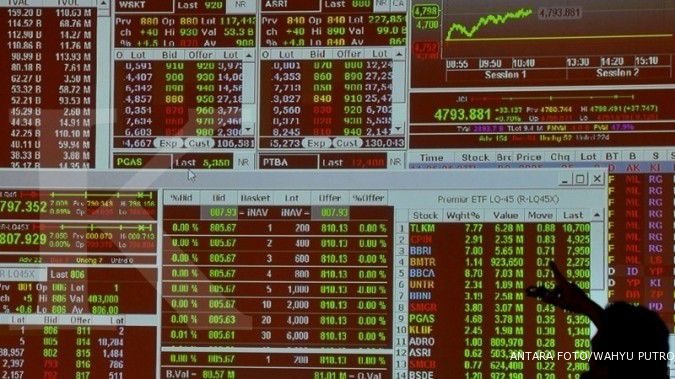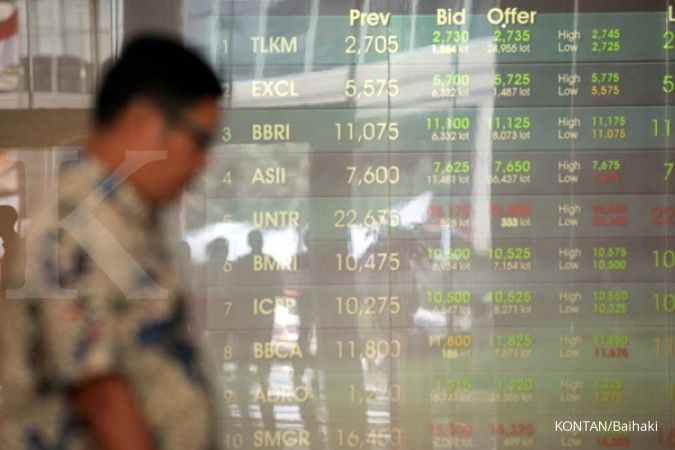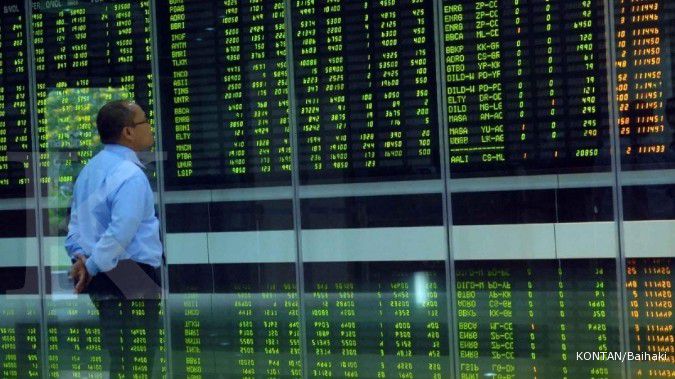JAKARTA. Companies listed in the Indonesia Stock Exchange’s (IDX) group of the 45 most-traded stocks, known as the LQ45, saw net profits decline by more than 5 percent on average on the back of the country’s economic slowdown and slowing expansion.
Commodity-producing companies suffered the highest drop amid plunging prices.
Analysts say a lower Bank Indonesia interest benchmark and realization of the government’s infrastructure projects will be the key to improving corporate earnings.
According to first-quarter data compiled by The Jakarta Post, 41 companies saw their bottom lines constrict by, on average, 5.15 percent, with a slight revenue increase of just 2.57 percent. Nineteen companies, meanwhile, booked lower first-quarter net profits.
“It [the lower earnings] was due to economic slowdown, low commodity prices and currency depreciation, which hindered expansion-spending and led companies to delay their expansion plans,” Bahana Securities head of research, Harry Su, said.
“In addition, the government’s infrastructure projects have yet to start, resulting in slow growth in related sectors.”
On Thursday, President Joko “Jokowi” Widodo launched several toll-road projects and there are many other infrastructure projects in the works.
Some economists have predicted Indonesia, which relies on commodity exports to support its economy, might not be able to book 5 percent economic growth in the first quarter. Official data will be released on May 5.
Of six commodity companies in the LQ45 to have published their first-quarter results, only nickel producer Vale Indonesia (INCO) saw its bottom line grow, rising by 46 percent year-on-year (yoy). Palm oil firm Astra Agro Lestari (AALI) was the worst performer in the LQ45, with net profit slipping by 80 percent yoy.
Meanwhile, some companies, including state-run construction firm Wijaya Karya (WIKA), banked on government infrastructure projects as ways to generate sales. However, progress on the projects has been slow due to difficulty in land acquisition, leading WIKA to see its bottom line shrink by 63 percent yoy.
The disappointing first-quarter performance, which came to light in late April, has thrown the stock market into a record-breaking decline, after price barometer Jakarta Composite Index (JCI) corrected by 3.49 percent a week ago.
The JCI ended at 5,086 on Thursday — last week’s final trading day due to the Friday holiday — with a 6.42 percent plunge compared to the week before. On a weekly basis, the LQ45 index slumped by 8.53 percent on Thursday.
Around Rp 21.63 trillion of foreign capital exited the stock market last week, making a total of Rp 7.09 trillion of foreign net sales.
“We expect the condition to improve by the third quarter, when more government infrastructure projects kick off. As for the stock market, Bank Indonesia might be prompted to lower their interest benchmark in the second quarter given the current economic condition, and this might push up the index,” Harry said.
The BI rate was increased by 25 basis points to 7.5 percent in February, the first cut in two years after it was previously raised by 175 basis points in 2013 to maintain currency.
Universal Broker head of research Satrio Utomo said the central bank’s interest benchmark was the key to improving corporate earnings and the stock market condition.
“The economic slowdown was predicted long before the result was out and the stock market crashed last week because the results were far below expectation. Bank Indonesia has kept the rate high for too long to maintain currency, but it has led to further slowdown as companies look to the rate in making their expansion spending; and most decided not to make any,” he said.
“This creates a vicious cycle. Rather than curbing consumption and imports, we should shift to long-term downstream solutions to generate income and to meet local needs in handling the rupiah.”
At 12,937 per US dollar on Thursday, the rupiah remained hovering around its lowest level since the 1998 crisis. (Anggi M. Lubis)
/2015/04/30/186874005p.jpg)















